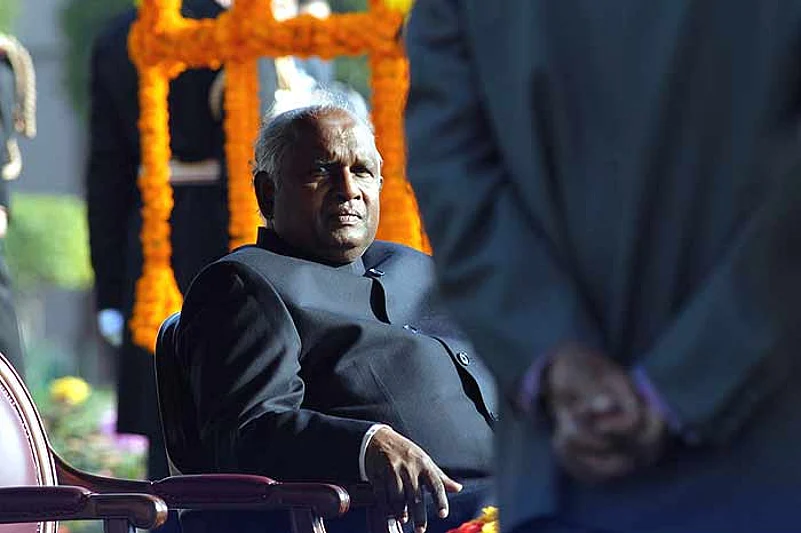The pressure has for long been mounting on K.G. Balakrishnan, former chief justice of India, to quit his post as chairman of the National Human Rights Commission (NHRC) with the revelation that his brother and two sons-in-law are in possession of unaccounted-for wealth. Many jurists, including former judges of the Supreme Court, are asking why, considering that all that wealth seems to have been acquired during his January 2007-May 2010 tenure as CJI, he has neither come clean nor resigned so far. This when the income tax department too has confirmed that the former CJI’s relatives are in possession of black money.
Though the income tax department hasn’t yet put a value to those assets, according to estimates submitted to the apex court by a petitioner, advocate Manoharlal Sharma, the properties involved alone are worth Rs 15 crore. On February 19, Chief Justice of India S.H. Kapadia not only admitted Sharma’s PIL seeking a judicial inquiry into the assets of Balakrishnan and his relatives, he summoned attorney-general Ghoolam Vahanwati to enquire about a more damning complaint against the former CJI, filed by Dr Mohammed Furqaan, a Delhi-based doctor and activist.
Furqaan’s complaint was filed on May 4, 2010, and copies were sent to the vice-president, the Lok Sabha speaker and Justice Kapadia. It alleges that a judgement by Balakrishnan in a family dispute involving a corporate house headed by two brothers was influenced through a common contact, Yusuf Ali, a Dubai-based NRI businessman. Ali is alleged to have mediated between Balakrishnan’s relatives and the brothers affiliated with the corporate house. Ali’s website, incidentally, has a picture of him with Balakrishnan and another of him with one of the brothers. The vice-president’s office had forwarded Furqaan’s complaint to the Union home ministry, which in turn sent it to the CBI. The Kochi office of the CBI is on the job.
There is concern in the legal fraternity about the accusations against Balakrishnan. “These are very serious allegations,” says J.S. Verma, a former CJI. “Going by Furqaan’s allegations, if there are pictures of the Dubai-based businessman with him and the leader of a corporate house, whose case he heard, it is even worse. He should not keep quiet; he should speak up to clear the allegations. And if there’s nothing against him, he should ensure that people levelling charges against him are booked. Otherwise, the law should take its course against him.” There are other questions from Sharma, who has filed the pil: How can Balakrishnan head the NHRC when there’s a probe against him, and how can he hear cases when he himself faces so many allegations? It’s a question, Sharma says, of people’s faith in the commission.
One of Balakrishnan’s sons-in-law, P.V. Srinijan, a lawyer who was associated with the Youth Congress, is also being investigated by the vigilance & anti-corruption bureau of the Kerala government, based on a complaint from one Shamir Valavattu of Mattancherry, Kochi. Among the properties acquired by Srinijan—during 2008-11—are expensive flats and riverside plots. E.T. Lukose, I-T director-general (investigations), told Outlook these assets—some of which were listed at values below current market assessment—were being probed by his department too. More complaints have been filed against Balakrishnan and his relatives in the last three months: George Battukulam of Malayalavedi, an NGO, filed one in Thrissur, in January, and there’s another, filed in Thiruvananthapuram by one Francis Pradeeplal. As Hosbet Suresh, a former judge of the Bombay High Court, says, “The number of complaints against Balakrishnan certainly calls for some serious thinking. I’m glad the Supreme Court has taken note of the matter and asked the government to keep it informed about the status of the investigations.”
He also makes a larger point—that although there were some complaints before, such as those against Y.K. Sabharwal, another former CJI, involving property deals in Delhi, they were unfortunately never taken up in earnest, creating the impression that if anyone raises a voice against judges, he would run the risk of inviting contempt proceedings. “Every single complaint should be looked into in order to uphold faith in the judiciary.” It’s something judges ought to think about.


























